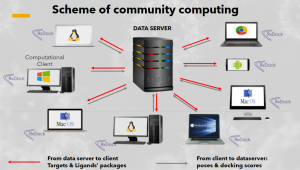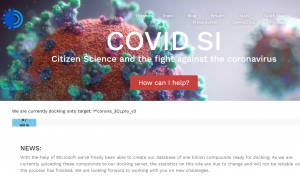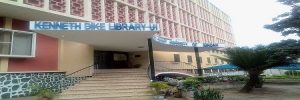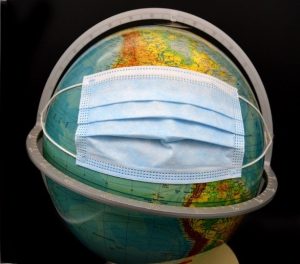- The “new reality” for Slovenian academic libraries is still there
The new coronavirus (SARS-CoV-2) has been affecting public life in Slovenia since the beginning of March 2020, when the first infection was confirmed, followed by an official acknowledgment of the epidemic. Universities and other institutions of higher education closed their physical premises and all academic activities went virtual. Although the Government of Republic of Slovenia declared the epidemic over on 31 May 2020, the study and research process until the end of the Summer semester (that is, by the end of June) was delivered mostly remotely.
While at the beginning of the first wave of the COVID-19 epidemic in Slovenia, no one imagined that it would soon cause an almost complete lock-down of public life, most academic libraries responded quickly to the new situation. They provided users with an increased range of electronic information resources and remote services. Online help and assistance to users in finding and using information resources during the complete closure of libraries was also organised. Within the Slovenian consortia for the purchase of electronic resources, negotiations for better conditions for access to licensed resources have intensified. This included cost-effective Article Processing Charges (APCs) in open access scientific journals and hybrid scientific journals as well as the sweetened costs for open access scientific monographs.
The period with good epidemiological situation in the country was short, lasting only until the beginning of October 2020. Universities and independent higher education institutions have entered the Winter semester, which begins on 1 October, by model B (named as «hybrid model»), which means the implementation of the study process partly remotely and partly onsite. In less than three weeks, on 18 October, the Government again declared an epidemic on the entire territory of the Republic of Slovenia. The country being hit with a second wave of COVID-19, higher education institutions have closed their physical premises again and for the second time, moved their activities to a virtual environment.
Due to the government’s measures to prevent the spread of new coronavirus infections, users will not be able to enter the premises of higher education libraries until further notice. It is possible to deliver library material by post or to pick it up without direct contact with library staff. Libraries are once again inviting users to use electronic resources and services as much as possible. Some of them are also actively involved in informing the public about the results of scientific research in the field of the new coronavirus and publish useful information to prevent the spread of infections and deal with possible infections. Among them, as an example of good practice, we would like to point out the Central Technical Library at the University of Ljubljana (CTK), which has established the website Coronavirus SARS-CoV-2 (COVID-19) and participates as a partner in the project “Citizen science and the fight against the coronavirus” (COVID.SI).
- Participation in the open science and citizen science as a challenge for the CTK
CTK is the main library and information centre in the field of natural sciences and technology in Slovenia. It provides information services for students, University of Ljubljana staff, researchers, and professionals. It is part of the national library network and member of the co-operative online bibliographic information system (COBISS.SI). It is also an official PATLIB centre of the European Patent Office, providing users with local access to patent information. The library manages the Digital Library of the University of Ljubljana portal, enables access to a rich collection of paid electronic journals, books and databases.
Furthermore, CTK is one of the leading libraries that support the development of open science. In cooperation with other higher education and special libraries in Slovenia it has organised The Open Science Network as a consulting centre for open science. The network provides consulting and user training in the following areas: open publishing, research data management, citizen science, and open education. The Network is part of the Slovenian national open research infrastructure and is a public service.
With the emergence of the new corona virus, Slovenian scientists have also become involved related research. A team of scientists led by dr. Črtomir Podlipnik from the Faculty of Chemistry and Chemical Technology at the University of Ljubljana in collaboration with other stakeholders, including CTK, has prepared a Citizen Science project COVID.SI, open to the general public, in order to join the forces fighting against coronavirus. Mag. Miro Pušnik, the director of CTK, shared with us some basic information about the project and about the role of the library in its establishment and development phase.
- SI : a Citizen Science project supported by the CTK
(The section below is a condensed interview of Mr Pušnik)
The COVID.SI project is focused on analysing molecular compounds and helping find a cure for new coronavirus. In this project, researchers are searching for ligands – small molecules that successfully dock into protein receptors and inhibit a specific process that is critical to the virus development. Knowing the interactions between a ligand and a receptor is key to understanding the biological response that occurs during ligand binding. When designing drugs by means of structural information, researchers typically design ligands that are complementary to biomolecules in shape and properties. The search for the right compound can be performed on volunteers’ computers. Therefore, researchers involved in the project, along with volunteers, have developed an easy-to-install software in order to download a subset of compounds and examine it. The results are then sent to a common data server where they are collected for further analysis.
 Podlipnik, Č., Jukić, M. & Pleško, S. Citizen science project to fight against Sars-CoV-2 by distributed computing. https://covid.si/p/1/en/
Podlipnik, Č., Jukić, M. & Pleško, S. Citizen science project to fight against Sars-CoV-2 by distributed computing. https://covid.si/p/1/en/
Anybody can participate in the project as a volunteer. Some individuals may only help by donating his/her computer time and sending the results back to the server, others may contribute by sharing useful information, and the most experienced ones may participate in the project’s strategy development, assist its technical implementation, prepare targets (protein structures) for molecular docking, suggest ligands, process virtual docking results, etc.
Initially, CTK’s role in this project was mainly to promote it and search for volunteers (via crowdsourcing). In Mr Pušnik words: “Here, our role in the university environment and our broad reach towards users were an advantage. We have also made our public relation service available”. In the completion phase, CTK provides its support to researchers by presenting the results in an open science environment, offering them assistance to share research data according to the FAIR standard, and publishing open access articles.
The promotion and development of citizen science is one of the main future orientations of the library. The Citizen Science CTK platform is just at the beginnings of its journey. It is developed in parallel with the emerging makerspace CTK and CTK’s Library of Things. To quote Mr Pušnik: “Our goal is a tighter connection of the local community and the University of Ljubljana. On the one hand, where feasible, we wish to attract as many volunteers as possible to the research activity. On the other hand, we are committed to a better accessibility and visibility of scientific works created at the university for the local community.”
- Conclusion: from academic library to citizen science
Last but not a least, we would like to emphasize that higher education libraries could play an important role in citizen science. Through their activities, they can promote networking between researchers and the wider community, and thus can become a kind of an incubator for citizen science projects. Bay way of example, one of the events to encourage the active participation of higher education libraries in citizen science, the professional meeting entitled “Citizen Science: the bridge between researchers and broader community«, was organized by CTK recently, on 11 November. A video of the meeting is available at https://www.youtube.com/watch?v=OcIj15lDaU0&feature=youtu.be&t=5.
Melita Ambrožič
Deputy Director for University of Ljubljana library system
National and University Library, Ljubljana, Slovenia
melita.ambrozic@nuk.uni-lj.si



